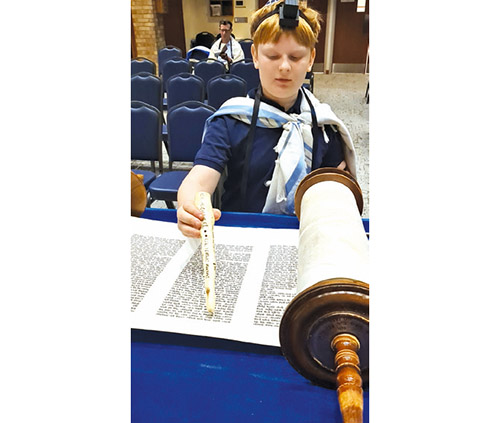
Omer Neumeier is on a mission: get more post-bar mitzvah boys to leyn Torah and lead services in Stamford. And he’s willing to pay them.
The age-old debate over monetizing a sacred responsibility may be rumbling here, but one could argue that today’s teens, much more distracted than their predecessors, require a bit of novel motivation to continue their Jewish engagement.
The GoFundMe project will provide a weekly stipend to young men ages 13-18 who prepare and perform a portion of the weekly Torah reading at a minyan in Stamford.
Neumeier set up the fund earlier this month as a gift to the Stamford Jewish community in honor of the bar mitzvah of his son Nadav. The project is not linked to any particular synagogue but is a way to encourage ongoing youth engagement throughout the community. Neumeier’s first objective is to convene an adult board to help manage the fund and identify and encourage young leyners.
The fund is named in memory of Eliezer Silverman z”l, a personal friend and pillar of the community who worked tirelessly to advance Jewish youth education and known for his book, “#Torah for Tweens.”
The Neumeiers, who moved to Stamford nine years ago from Michigan, celebrated Nadav’s bar mitzvah at Congregation Agudath Sholom for the weekday service and at the Young Israel of Stamford on Shabbat. Nadav had his bar mitzvah at Agudath Shalom on Thursday Jan 5th and at YIS that Shabbat Jan 7th where he read the full parsha Vayechi. The next week on Thursday Jan 12th Nadav lained the first portion of that day’s laining (the parsha following his bar mitzvah parsha: Shmot). He aims to continue each week to lain the first portion on Thursdays. “We want to help him keep up his leyning,” Neumeier said. “One way is to grow a group of boys to maintain that skill set, as you don’t see this age group leyning regularly.”
Even a teen like Nadav—who has the chops to leyn and access to an accomplished Torah teacher, his grandfather, Yedidia Neumeier—can be pulled in many directions.
“Every generation has its distractions, especially living in a secular world, and a lot of kids who would naturally pick this up in another generation or environment have even more,” Neumeier said. “I think my son has it harder than I did: the availability of content and screen time as an addiction that grabs us all is a challenge. He loves to play video games and watch TV. But he also loves Torah and loves to leyn, so as much as we can tip the scales to help motivate him—even one day a week to learn one aliyah—will be a benefit to the community.”
On the flip side, that same technology offers more powerful resources than were available to prior generations, like YouTube to learn the parshiot and Sefaria to understand the mefarshim.
Back to the debate: Is it acceptable to pay a baal koreh? As with many Halachic issues, this one provides a robust machloket. After all, Judaism constantly struggles with the tension between the practical and the spiritual, the animal soul contending with the Godly soul.
“The baalei koreh I speak with are split,” Neumeier said. “Half say, ‘I got paid when I started out; why shouldn’t others?’ and they are supportive of the fund and happy to donate. Half don’t think it’s a good idea to ‘bribe’ kids to leyn and believe it should be lishma, because they love it. When I was a kid, I worked as a camp counselor because I loved it, and I also got paid. So I don’t think they’re necessarily different opinions—all those who are okay with paying prefer that the kids come to leyning out of love. Maybe the kids can start out with a practical motivation and develop the love over time. Our job is to put those two motivations together.”
There’s a middle road, according to Neumeier: recruit the community’s rabbis to help encourage would-be young leyners and instead of paying them individually, organize fun group activities as incentive, like go-kart racing.
With the goal of eventually fostering a second community teen minyan in Stamford, Neumeier and a friend are working to identify a group of young men who would meet weekly to practice not only leyning but also leading services.
While paying adult baalei koreh may be common, Neumeier’s project might be the first aimed at teens. The closest model he found is a community group in Berkeley, California where kids are encouraged to practice leyning together but don’t receive payment. Neumeier would like to see the concept scaled up and fostered across the Northeast and developed into a more systematic Torah-training program for kids.
“Is it sustainable? I suspect that there’s some value in the project, that it could be something good for the Jewish people as a way to keep the tradition, the holy task, alive,” Neumeier said. “It’s better for a kid to do one aliyah a week than the whole reading once and never do it again.”
To learn more about the fund, visit https://gofund.me/b03e9a8a or email oneumei@gmail.com.
By Cynthia Mindell










